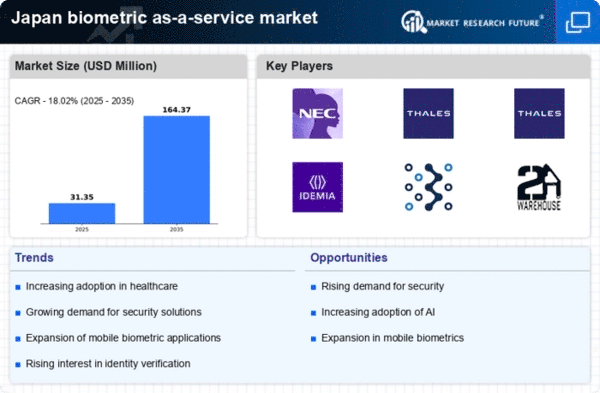Increased Cybersecurity Threats
The biometric as-a-service market is significantly influenced by the rising incidence of cybersecurity threats in Japan. With the proliferation of digital transactions and online services, organizations are seeking more secure authentication methods to protect sensitive data. Biometric solutions, which offer a higher level of security compared to traditional password systems, are becoming essential. Reports indicate that cyberattacks in Japan have increased by over 30% in recent years, prompting businesses to invest in biometric technologies. This trend suggests that the biometric as-a-service market will continue to expand as companies prioritize security measures to safeguard their operations and customer information.
Consumer Awareness and Acceptance
Consumer awareness and acceptance of biometric technologies are rising in Japan, contributing to the growth of the biometric as-a-service market. As individuals become more familiar with biometric authentication methods, such as fingerprint and facial recognition, their willingness to adopt these technologies increases. Surveys indicate that over 60% of Japanese consumers express confidence in biometric solutions for securing personal information. This growing acceptance is likely to drive demand for biometric as-a-service offerings, as businesses seek to align with consumer preferences for secure and convenient authentication methods. The industry appears poised for growth as consumer trust in biometric technologies solidifies.
Government Initiatives and Support
Government initiatives in Japan are playing a crucial role in the expansion of the biometric as-a-service market. The Japanese government is actively promoting the adoption of biometric technologies across various sectors, including healthcare, transportation, and public safety. Initiatives aimed at enhancing national security and improving public services are driving investments in biometric solutions. For example, the government's focus on smart city projects is likely to increase the demand for biometric systems in urban environments. This supportive regulatory environment suggests that the biometric as-a-service market will continue to thrive as public and private sectors collaborate to implement advanced security measures.
Growing Adoption in Financial Services
The financial services sector in Japan is increasingly adopting biometric as-a-service solutions to enhance security and streamline customer experiences. Banks and financial institutions are implementing biometric authentication methods, such as voice recognition and facial recognition, to facilitate secure transactions and reduce fraud. The market for biometric solutions in the financial sector is expected to reach approximately $1 billion by 2026, reflecting a growing recognition of the benefits these technologies offer. This trend indicates that the biometric as-a-service market will likely see substantial growth as financial institutions prioritize security and customer satisfaction.
Technological Advancements in Biometric Systems
The biometric as-a-service market in Japan is experiencing a surge due to rapid technological advancements in biometric systems. Innovations in artificial intelligence and machine learning are enhancing the accuracy and efficiency of biometric identification methods. For instance, facial recognition and fingerprint scanning technologies are becoming more sophisticated, leading to improved user experiences. The market is projected to grow at a CAGR of approximately 15% from 2025 to 2030, driven by these advancements. As organizations increasingly adopt biometric solutions for security and authentication, the demand for biometric as-a-service offerings is likely to rise, indicating a robust growth trajectory for the industry.
















